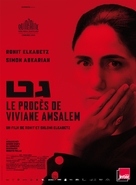Reviews provided by RottenTomatoes
Farran Smith Nehme, New York Post: A couple of plot turns threaten to overload the drama, but overall this divorce is more riveting than many a murder trial. Read more
Jay Weissberg, Variety: Siblings Ronit and Shlomi Elkabetz bring their blistering trilogy of male domination in an Israeli family to a rewarding close with Gett, the Trial of Viviane Amsalem. Read more
Keith Uhlich, AV Club: This all might be laughable if it wasn't based on the very real facts of the Israeli court system, which as portrayed here is like Kafka without the surrealist trappings. Read more
Peter Keough, Boston Globe: A microcosm of women victimized by patriarchal institutions worldwide as well as an allegory of the universal struggle for freedom. Read more
Ben Sachs, Chicago Reader: One feels the oppressiveness of Israeli domestic law, but how one is supposed to feel about the subjects isn't clear. Read more
Michael Phillips, Chicago Tribune: A highly compressed, exquisitely acted tale of two people who do not belong together plays out as a courtroom saga that, in story terms, runs longer than many marriages. Read more
Peter Rainer, Christian Science Monitor: This may not sound like the merriest way to spend time in a movie theater, but Gett is compelling from its first frame. Read more
Tom Long, Detroit News: Ultimately the movie is wearying, but then it's likely supposed to be. If Viviane's going through the wringer, you're going through the wringer too. Read more
Leslie Felperin, Hollywood Reporter: In the hands of sister-brother co-directors Ronit Elkabetz (who also co-stars) and Shlomi Elkabetz this patriarchal legal loophole becomes the wellspring for densely rich drama, told with stringent austerity but also humor and judicious empathy. Read more
Betsy Sharkey, Los Angeles Times: The divorce-centered drama is so provocative it's become a lightning rod for debate inside the country. Even watching from a distance is unnerving. Read more
Anthony Lane, New Yorker: Almost all of the film takes place inside a courtroom, at irregular intervals over five years, but there is no sense of drag or slump; on the contrary, the action quivers with tension, impatience, comic heat, and, beneath it all, an irrepressible rage. Read more
Manohla Dargis, New York Times: Gripping cinema from start to finish, almost implausibly so. Read more
Steven Rea, Philadelphia Inquirer: Shot in intense close-ups, the better to study the emotions burning off the characters' skin, the film is all talk and gestures, but it begins to take your breath away like a chase movie would. Read more
John Hartl, Seattle Times: It's tough and unsparing, but the grimness is never gratuitous. Read more
David Lewis, San Francisco Chronicle: Elkabetz commands the screen whether she's quietly seething or lashing out at the judges and their pointed questions. Her plight provides a painful argument that marriage - and divorce - are better served in the civil sphere. Read more
Joe Williams, St. Louis Post-Dispatch: As Viviane laments, this kind of thing wouldn't happen in America. True, but there's not an actress in America who wouldn't twist her hair into a bun for the chance to play this role. Read more
Linda Barnard, Toronto Star: It may puzzle audiences unfamiliar with the Israeli system but the rigid religious bureaucracy devoted to keeping a married couple together at all cost makes for a superb way of adding layers of tension to this effective drama. Read more
Joshua Rothkopf, Time Out: The acting, especially from Menash Noy as an ineffectual attorney, is phenomenal, resulting in a feminist knockout told in inverse. Read more
Simon Abrams, Village Voice: The film never devolves into finger-wagging hysterics thanks to Ronit and brother/co-director Shlomi Elkabetz's keen attention to their actors' performances, especially Ronit's star turn. Read more
David Edelstein, New York Magazine/Vulture: Gett has a formal rigor that works like a vise. Read more
Michael O'Sullivan, Washington Post: Despite the seemingly uncinematic nature of this inert, even claustrophobic scenario, the film mesmerizes, utterly. Read more

